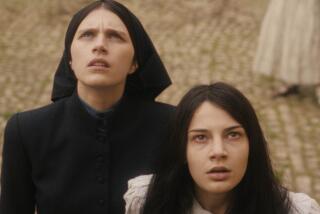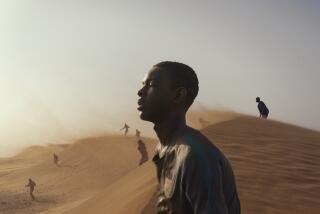Review: ‘Two Faces of January’ a twisted tale driven by talented trio
Ambiguity is the intrigue in “The Two Faces of January,” the new thriller starring Viggo Mortensen, Kirsten Dunst and Oscar Isaac.
Acclaimed writer Hossein Amini, making his feature directing debut, sets it up beautifully on a sun-washed day in Athens, Greece, in the early 1960s. Rydal (Isaac), a snappy, self-assured tour guide, is leading a handful of very attentive young beauties along the ancient stone steps of the Acropolis. At a distance a perfectly polished affluent American couple, Chester (Mortensen) and Colette (Dunst), are posing playfully for each other, all smiles.
Both the couple and the tour guide deserve a second look. Their eyes lock, and though the moment seems innocent enough, there is a sense that something darker is coming.
Amini, whose skillful translation of Henry James’ “The Wings of the Dove” earned him an Oscar nomination in 1998, adapted “Two Faces” as well. It is based on a lesser work from novelist Patricia Highsmith and echoes the complex moral quandaries that bound up her characters in “The Talented Mr. Ripley” so wickedly.
Though the players in “Faces” aren’t quite as calculating, they are complicit in how this twisted tale plays out. And therein is the rub that keeps “Two Faces” running.
Initially it appears that the couple is the likely prey. The charming tour guide speaks Greek fluently, but he is an American, there to help tourists handle the vagaries of foreign financial transactions. Whether it’s as simple as paying for a bottle of wine or as dicey as acquiring a fake passport, he turns money-changing hands into a shell game, always secretly pocketing a healthy profit for himself.
After another chance encounter between the trio, Chester and Colette invite Rydal to dinner. He turns up even more dapper and delightful, with Lauren (Daisy Bevan), one of the girls from the tour, at his side. As Chester draws him out, Rydal becomes more interesting. Greek is just one of many languages he has mastered, his family more prominent than expected.
The conversation begins to feel so comfortable that it is easy to let your guard down. Don’t. Amini is just getting ready to go in for the kill.
Later than night, when the couples have gone their separate ways, there is a frightening confrontation and an accident involving Chester and Colette at their posh hotel. The façade of normalcy begins to dissolve. When Rydal returns to the hotel with the bracelet Colette dropped in the taxi, the mantle of villain begins to shift to Chester.
The hotel situation is only the first of a long line of dominoes that will drop, but it is serious enough to send Chester and Colette scrambling for their lives and put Rydal suddenly in the role of savior. But nothing is ever settled. Difficult and equally unexpected situations arise at every turn. All require dangerous, and questionable, choices.
As spine-tingling as the twists are, the larger questions being raised are as tantalizing: Are destinies intertwined by chance or fate? Do accidents make the distance between what is right and what is wrong fuzzier?
As the stakes go up, so does the heat.
The Grecian sun, so warm in the opening moments as director of photography Marcel Zyskind bathes his subjects in light, turns unforgiving a day or so later in Crete and deadly by Istanbul. By now they are on the run, with Rydal pressing a friend to make the couple fake passports, Chester pressing more money into his hands and Colette beginning to press for escape of a different sort.
That sea change in Colette’s emotions and allegiance becomes as critical a turning point as the unfortunate accident that set this cat-and-mouse came in motion. As was the case in the book, there are moves that don’t always make sense, but the game-playing is riveting.
Amini has a powerful acting triumvirate in Mortensen, Dunst and Isaac to help him deal with the capricious nature of this particular tangled web. Even when the plot threatens to crumble, the actors know what to do with the pieces.
In Chester, Mortensen is more vulnerable than we usually see. After the unwavering intensity he’s brought to films like “A History of Violence,” “The Road” and his Oscar-nominated role in “Eastern Promises,” slightly less tightly wound is a nice change of pace, but one the actor doesn’t wear quite as comfortably.
Dunst remains exceptional and too often underrated. That her woman deconstructed in 2011’s “Melancholia” didn’t earn more praise is a pity. The notes she’s given to play in “Two Faces” are lighter; still, she brings a potent complexity to Colette; every mood shift registers to the bone.
But this is Isaac’s movie. As off-putting as some found his brooding folk-singer in the Coen brothers “Inside Llewyn Davis,” the film and the performance, both underrated in my mind, did put him on the map. Amini showcases that quality in another light.
In Rydal, the actor smolders on screen. It is mesmerizing whether he is enthralled by Colette or enraged by Chester. The film may be called “The Two Faces of January,” but Isaac’s is the only one you will care about.
Twitter: @BetseySharkey
----------------------------------
‘The Two Faces of January’
MPAA rating: PG-13 for some violence, language and smoking
Running time: 1 hour, 37 minutes
Playing: In select theaters
More to Read
Only good movies
Get the Indie Focus newsletter, Mark Olsen's weekly guide to the world of cinema.
You may occasionally receive promotional content from the Los Angeles Times.







